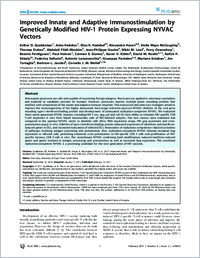Improved innate and adaptive immunostimulation by genetically modified HIV-1 protein expressing NYVAC vectors
- Quakkelaar, Esther D. Department of Immunohematology and Blood Transfusion, Leiden University Medical Center, Leiden, The Netherlands
- Redeker, Anke Department of Immunohematology and Blood Transfusion, Leiden University Medical Center, Leiden, The Netherlands
- Haddad, Elias K. Laboratoire d’Immunologie, Centre de Recherche du Centre Hospitalier de l’Université de Montréal (CR-CHUM), Montreal, Canada
- Harari, Alexandre Division of Immunology and Allergy, Centre Hospitalier Universitaire Vaudois, Lausanne, Switzerland - Swiss Vaccine Research Institute, Lausanne, Switzerland
- McCaughey, Stella Mayo Department of Medicine, University of Washington, Seattle, Washington, United States of America
- Duhen, Thomas Institute for Research in Biomedicine (IRB), Faculty of Biomedical Sciences, Università della Svizzera italiana, Switzerland
- Filali-Mouhim, Abdelali Laboratoire d’Immunologie, Centre de Recherche du Centre Hospitalier de l’Université de Montréal (CR-CHUM), Montreal, Canada
- Goulet, Jean-Philippe Laboratoire d’Immunologie, Centre de Recherche du Centre Hospitalier de l’Université de Montréal (CR-CHUM), Montreal, Canada
- Loof, Nikki M. Department of Immunohematology and Blood Transfusion, Leiden University Medical Center, Leiden, The Netherlands
- Ossendorp, Ferry Department of Immunohematology and Blood Transfusion, Leiden University Medical Center, Leiden, The Netherlands
- Perdiguero, Beatriz Centro Nacional de Biotecnologia, CSIC, Madrid, Spain
- Heinen, Paul Centro Nacional de Biotecnologia, CSIC, Madrid, Spain
- Gomez, Carmen E. Centro Nacional de Biotecnologia, CSIC, Madrid, Spain
- Kibler, Karen V. Arizona State University, Tempe, Arizona, United States of America
- Koelle, David M. Department of Medicine, University of Washington, Seattle, Washington, United States of America - Vaccine and Infectious Diseases Division, Fred Hutchinson Cancer Research Center, Seattle, Washington, United States of America
- Sékaly, Rafick P. Laboratoire d’Immunologie, Centre de Recherche du Centre Hospitalier de l’Université de Montréal (CR-CHUM), Montreal, Canada
- Sallusto, Federica Institute for Research in Biomedicine (IRB), Faculty of Biomedical Sciences, Università della Svizzera italiana, Switzerland
- Lanzavecchia, Antonio Institute for Research in Biomedicine (IRB), Faculty of Biomedical Sciences, Università della Svizzera italiana, Switzerland
- Pantaleo, Giuseppe Division of Immunology and Allergy, Centre Hospitalier Universitaire Vaudois, Lausanne, Switzerland - Swiss Vaccine Research Institute, Lausanne, Switzerland
- Esteban, Mariano Centro Nacional de Biotecnologia, CSIC, Madrid, Spain
- Tartaglia, Jim Sanofi Pasteur, Swiftwater, Pennsylvania, United States of America
- Jacobs, Bertram L. Arizona State University, Tempe, Arizona, United States of America
- Melief, Cornelis J. M. Department of Immunohematology and Blood Transfusion, Leiden University Medical Center, Leiden, The Netherlands - ISA Pharmaceuticals B.V., Bilthoven, The Netherlands
-
15.02.2011
Published in:
- Plos one. - 2011, vol. 6, no. 2, p. e16819
English
Attenuated poxviruses are safe and capable of expressing foreign antigens. Poxviruses are applied in veterinary vaccination and explored as candidate vaccines for humans. However, poxviruses express multiple genes encoding proteins that interfere with components of the innate and adaptive immune response. This manuscript describes two strategies aimed to improve the immunogenicity of the highly attenuated, host-range restricted poxvirus NYVAC: deletion of the viral gene encoding type-I interferon-binding protein and development of attenuated replication-competent NYVAC. We evaluated these newly generated NYVAC mutants, encoding HIV-1 env, gag, pol and nef, for their ability to stimulate HIV-specific CD8 T-cell responses in vitro from blood mononuclear cells of HIV-infected subjects. The new vectors were evaluated and compared to the parental NYVAC vector in dendritic cells (DCs), RNA expression arrays, HIV gag expression and crosspresentation assays in vitro. Deletion of type-I interferon-binding protein enhanced expression of interferon and interferoninduced genes in DCs, and increased maturation of infected DCs. Restoration of replication competence induced activationof pathways involving antigen processing and presentation. Also, replication-competent NYVAC showed increased Gag expression in infected cells, permitting enhanced cross-presentation to HIV-specific CD8 T cells and proliferation of HIVspecific memory CD8 T-cells in vitro. The recombinant NYVAC combining both modifications induced interferon-induced genes and genes involved in antigen processing and presentation, as well as increased Gag expression. This combined replication-competent NYVAC is a promising candidate for the next generation of HIV vaccines.
- Language
-
- English
- Classification
- Medicine
- License
- Open access status
- gold
- Identifiers
-
- RERO DOC 326633
- DOI 10.1371/journal.pone.0016819
- ARK ark:/12658/srd1318987
- Persistent URL
- https://n2t.net/ark:/12658/srd1318987
Statistics
Document views: 152
File downloads:
- Texte intégral: 195
